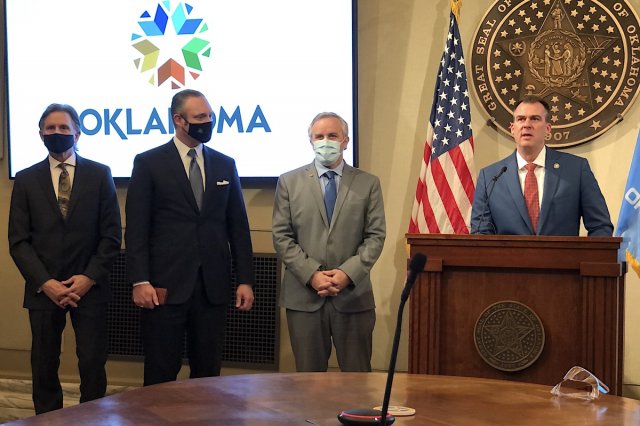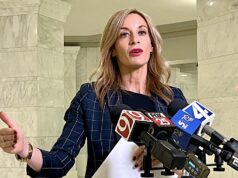

Residents of lesser-populated Oklahoma communities that purchase natural gas from small, unregulated companies are at the greatest risk of receiving massive utility bills in the next two months as the result of higher gas prices during recent weather disruptions, state leaders said this morning.
Meanwhile, regulated electricity and gas providers such as OG&E, PSO, ONG, the Grand River Dam Authority, the Oklahoma Municipal Power Authority and rural electric cooperatives are expected to spread their increased costs across customer bills for several months and possibly years.
“We need to understand that the vast majority of Oklahomans will not see a dramatic increase in their utility bills as a result of these rising gas costs,” Secretary of Energy and Environment Kenneth Wagner said Monday before noting that customers will still see higher bills because they likely used more electricity or gas. “We will see increases in bills as a result of increases of two to three times of usage.”
Wagner told media that he personally saw natural gas prices climb to $300 or $400 per thousand cubic feet and has heard the rumors that, at some point, the price reached $1,100. Normally, he said, the price sits around $2 or $3, and climbs to about $5 for a typical winter storm.
‘There has been market manipulation’
Attorney General Mike Hunter said his office will be looking at gas prices over the past two weeks to identify potential violations of the Emergency Price Stabilization Act, which caps a commodity’s price increase at 10 percent for 30 days after the president or governor declares a state of emergency. Gov. Kevin Stitt did so Friday, but Hunter said prices were already climbing at that point.
“There is evidence that there has been market manipulation that has gone on,” Hunter said. “Where entities have taken advantage of the suffering of Oklahoma, we’re going to hold those entities accountable.”
Hunter asked Oklahomans to report potential pricing violations to his office, and he urged utility companies to suspend automatic bank withdrawals for their customers for at least 90 days to “avoid payments that don’t go through, as well as (avoid) putting customers in a bad situation with their banks.”
He said the “myriad of ways” that natural gas is marketed “does present a challenge” for monitoring compliance with the law.
Asked which unregulated companies sell natural gas to towns in Oklahoma, Wagner declined to name any specific entity, but he did say he has heard the cities of Jay and Grove, in northeast Oklahoma, are concerned about facing enormous gas bills. Those communities receive electricity from the Grove Municipal Services Authority, representatives of which posted on social media last week to warn residents that GMSA was about to burn through its gas reserves and would have to purchase more natural gas at outrageous prices.
“I received probably 300 calls in 24 hours,” said Rep. Josh West (R-Grove). “(City leaders) were trying to give people updates on the current costs of gas, so they put something on social media. At the time, natural gas was trading at $622 (…) up from $4 just a few days earlier. So they wanted to, in the spirit of transparency, let the consumers know that the cost was going up.”
West said that, since natural gas is a regulated commodity, he thought consumers would be protected from price spikes by the Oklahoma Corporation Commission. But with GMSA having to purchase gas from the “spot market” — or daily market — the issue may be more complicated.
West said he was told GMSA purchased gas from Constellation Energy, a Baltimore-based subsidiary of the nuclear energy company Exelon.
Another northeastern Oklahoma town — Chelsea, population 2,000 in Rogers County — is also reportedly bracing for steep gas bills.
Follow @NonDocMedia on:
‘We’re going to get to the bottom of what happened’
Joining Hunter and Wagner at Monday morning’s press conference were Oklahoma Gov. Kevin Stitt, Director of Emergency Management and Homeland Security Mark Gower, Senate President Pro Tempore Greg Treat (R-OKC) and House Speaker Charles McCall (R-Atoka). While it’s unclear exactly what the governor and legislative leaders may be able to do for Oklahomans facing high energy bills, the wheels of government are turning.
“We’re going to get through this, and we’re going to do everything we can to help Oklahoma’s families get through this, and we’re going to get to the bottom of what happened,” Stitt said. “When I talked with President (Joe) Biden last week, I made sure he knew all the challenges we were facing here in Oklahoma. (…) He pledged his support.”
Stitt said he will travel to Washington this week to meet with Oklahoma’s congressional delegation and members of the Biden administration. Meanwhile, Treat announced the formation of a special State Senate committee, chaired by Sen. James Leewright (R-Bristow).
“I have no preconceived notions of where the study will go,” Treat said of Leewright’s committee.
House Speaker Charles McCall said the House Utilities Committee will study the situation on his side of the building, and he said he hopes rumors that looming utility bills could be multiplied by factors of 20 or 40 are just that — rumors and speculation. He said such bills would be “not acceptable” to the Legislature.
“We will conduct public hearings on the matter to ascertain what needs to be done going forward. What is very unique about this event is that it affected all 101 House districts in the state of Oklahoma. Typically we see natural disasters just affect certain parts of the state,” McCall said. “This one has affected everybody in the state of Oklahoma. Certainly one that was unforeseen.”
Gower, the director of emergency management, asked Oklahomans to report their frozen pipes, busted pipes, power surges and other storm damage at damage.ok.gov. Oklahoma will be seeking federal funding to assist with storm recovery.
“In particular the rural parts of the state where you have rural water districts that have hundreds of miles of water lines that are serving people (…) they have had multiple breaks that need to be repaired,” McCall said. “Those come with great costs to the state, and the people of the state of Oklahoma are very concerned what that’s going to mean to them on the next set of utility bills.”




















